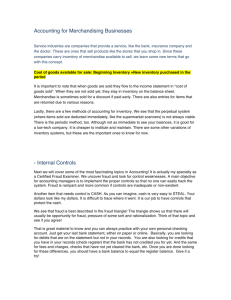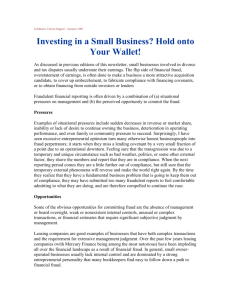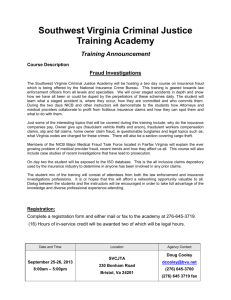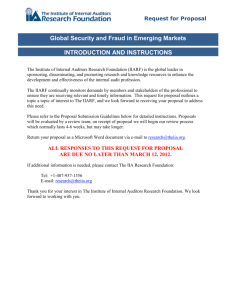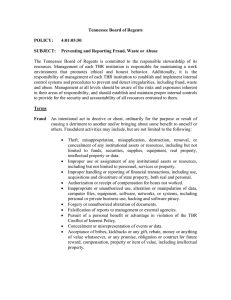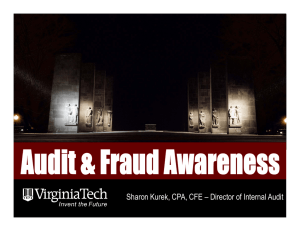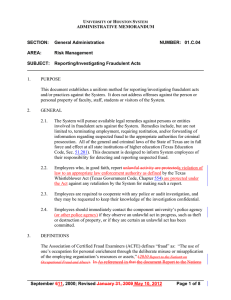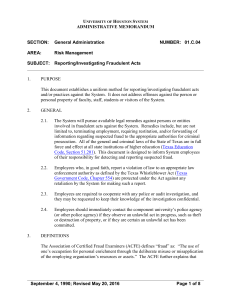In Conclusion
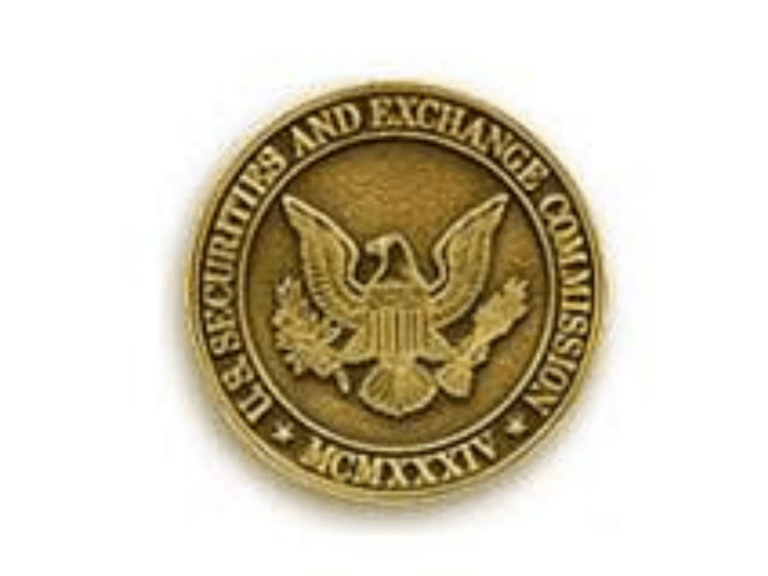
In Conclusion
Baruch College
The Sixth Annual Financial
Reporting Conference
May 3, 2007
Susan G. Markel
Chief Accountant, Div. of Enforcement
The U.S. Securities and Exchange Commission, as a matter of policy, disclaims responsibility for any private publication or statement by any of its employees. Views expressed herein are those of the presenter and do not necessarily reflect the views of the Commission or other members of the staff of the Commission.
Today’s Topics
SEC Enforcement
Focusing on Financial Fraud and Financial Reporting
Matters
Financial Fraud is:
“… Intentional or reckless conduct, whether act or omission, that results in materially misleading financial statements…” involving
“ . . . gross and deliberate distortion of corporate records, … falsified transactions, … [or] the misapplication of accounting principles.”
Report of the National Commission on Fraudulent Financial Reporting; COSO, October 1987
Fraud is Different than Errors
“Fraudulent financial reporting differs from other causes of materially misleading financial statements, such as unintentional errors.”
Report of the National Commission on Fraudulent Financial Reporting; COSO, October 1987
Three Conditions are Usually
Present:
Management has an incentive or is under pressure
The opportunity exists for a fraud to be perpetrated
The fraudsters rationalize their fraudulent acts
Statement on Auditing Standards 99, October 2002
Existence of an exit strategy
The Slippery Slope of a Financial
Fraud:
Starts with “making the numbers”
Then, “Managing the Numbers”
Ends with “making up the numbers”
Rationalization includes:
“We need to make our projections…”
“I’m getting pressure from the boss…”
“We need to meet Street expectations…”
“Our acquisition will fall through if we don’t…”
And, as is frequently predicted --
“We’ll make it up next quarter…”
But, even a simple mistake can be turned into a financial fraud through “cover-up” efforts.
Categories of Fraud
Get rich quick – and disappear even faster
Greed/ego/credibility frauds
Survival frauds – for the good of the company
Sources of Enforcement Cases
Other SEC Offices or Divisions
Issuers’ Self-Reporting
Auditor Reports
Change in Auditors
10A
Sources of Enforcement Cases
PCAOB
404 Reports
Restatements
Enforcement Complaint Center
Recent Actions Brought
McAfee
Raytheon Company
Delphi
AIG
Collins & Aikman
Hollinger, Inc.
RenaissanceRe Holdings
And More . . .
Tyco International
Fannie Mae
Brocade Communications officers
Comverse Technology officers
Buca, Inc.
PBSJ
Doral Financial Corporation
Excelligence Learning Corporation
Common Fraud Schemes
Improper revenue recognition
McAfee (formerly Network Associates)
AremisSoft
Applix
Peregrine Systems, Inc.
Safescript Pharmacies
Robotic Vision Systems
eFunds
(and many more)
Common Fraud Schemes
Excess reserves to smooth earnings
Improper accounting for vendor rebates
Improper capitalized costs
Changing estimates “to make the numbers”
Top-Side and Period End Journal Entries
“Earnings Management”
Other Types of Cases
Related party transactions
Undisclosed compensation
Non-financial metrics
Variable-length quarters
Financial products to manage earnings
False/misleading disclosures/omissions in MD&A
(Reg. S-K -- known trends and uncertainties) and in financial statements (Reg. S-X)
FCPA
Stock option backdating
If It Seems Too Good To
Be True -- It Probably Is
FINANCIAL REPORTING AND
ISSUER DISCLOSURE
Areas of Focus
Financial Reporting Requires
Good Disclosure as Well as Good
Accounting
Individuals Should Be Held Personally
Responsible for Misconduct
Officer & Director bars
Disgorgement
Cooperation is Extremely Important in Financial Fraud Investigations
The Meaning of Cooperation
Self-policing prior to discovery of misconduct
Effective compliance procedures
Appropriate “tone at the top”
Self-reporting misconduct upon discovery
Thorough review of nature, extent, origins & consequences
Disclosure to public and regulators
The Meaning of Cooperation
Remediation
Dismissing or appropriately disciplining wrongdoers
Internal controls and procedures to prevent recurrence
Compensating those adversely affected
Cooperation with law enforcement authorities
Continued Coordination with
Criminal Authorities
Perception
Vs.
Deception
Untested Perception
Allows for
Undiscovered Deception
Areas of Focus
Conduct of Gatekeepers Scrutinized
Attorneys
Directors
Audit Committees
And, of course . . .
Accountants and Auditors
Every case STILL raises the question:
Protecting the Integrity of the
Audit Workpapers
“Process” Cases
Tenet Healthcare – KPMG Auditors
E&Y Audit Partner and Senior Manager
(NextCard)
SmarTalk Teleservices, Inc. and PwC
American Tissue – AA Auditors
Other Auditor Matters – and
Settlements
“Basic” Audit Failures
Planning
Execution
Analysis
“Basic” Audit Failures
Lack of evidence
Over reliance on management representations
Improper confirmation process
Inadequate testing of internal controls
Incorrect disposition of identified errors
Independence
Facilitating Another Company’s
Reporting Violations May Create
Liability
Recent Examples
Delphi
Royal Ahold – U.S. Foodservice
Scientific-Atlanta (Adelphia)
Areas of Focus
WHO ?
WHAT?
WHERE?
WHEN?
WHY?
HOW?
AND THEN WHAT --- Appropriate remedy ?


